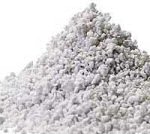Properties and characteristics of the main natural and ecological insulation.
This page is part of the file on natural insulation.
4) Perlite or vermiculite

Unknown, perlite is an ecological insulator made from crushed volcanic rocks and expanded thermally to more than 1000 ° C: by evaporating the water inflates the fine particles of rock that store air.
Perlite is completely inert, non-flammable, rot-proof, insensitive to insects and rodents and totally free from toxicity.
In the form of ridged panels or bulk, it is used mainly for the isolation of attics and roofs.
It is the only insulator for lost attics which can be considered to have unalterable properties over time.
Thermal properties:
- Thermal conductivity: 0,045 0,05 to W / m ° C.
- Thermal resistance for a layer cm 10: 0,1 / 0,05 2 = m² ° C / W..
More: others natural insulation

Can perlite be mixed with concrete for the construction of support walls?
I say YES, and I specify why. I used vermiculite concrete in 1988, under the upstairs bathroom,
(renovation of the old fodder barn): this concrete was inserted into "nyweb" type joists: a mixture of wooden purlins (too lightened…) held by galvanized metal braces. I reinforced the beam like normal concrete. Advantage = a lot of concrete, less heavy… I recommend this use, much easier than the styrene ball (maybe less expensive?) But which, at the slightest gust of wind = puts it everywhere around the concrete mixer…. Ditto for a stump on roof, chimney:
lightened concrete, non-flammable = no battens, standard respected… I had checked these (interesting) possibilities, but I do not know if there is a DTU for walls. (new fireplace in renovation: around 2000)